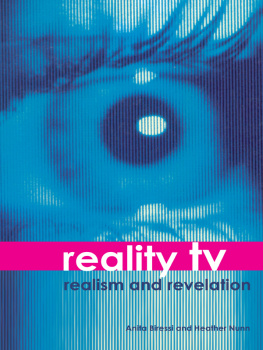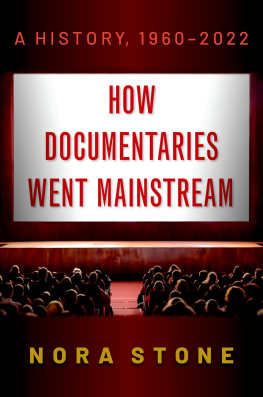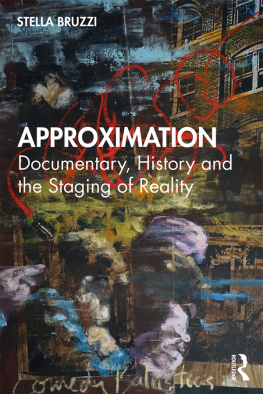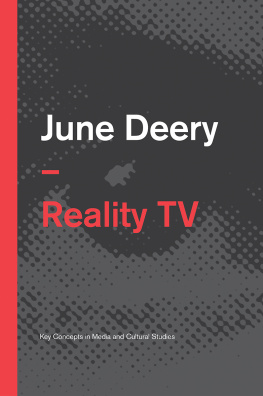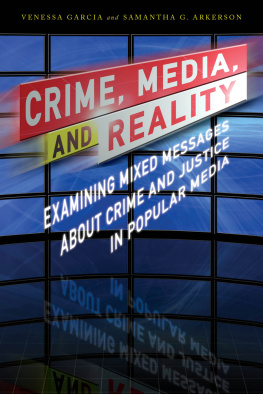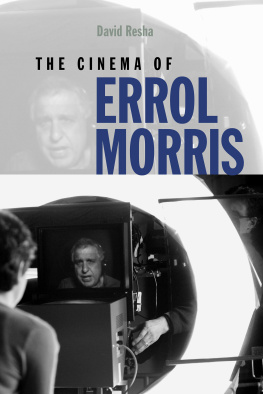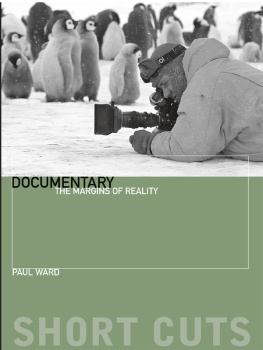reality tv
realism and revelation
reality tv
realism and revelation
Anita Biressi and Heather Nunn
WALLFLOWER PRESS
LONDON & NEW YORK |  |
A Wallflower Press Book
Published by
Columbia University Press
Publishers Since 1893
New York Chichester, West Sussex
cup.columbia.edu
Copyright Anita Biressi & Heather Nunn 2005
All rights reserved.
E-ISBN 978-0-231-85026-1
Wallflower Press is a registered trademark of Columbia University Press.
A complete CIP record is available from the Library of Congress
ISBN 978-1-904764-05-2 (cloth : alk. paper)
ISBN 978-1-904764-04-5 (pbk. : alk. paper)
ISBN 978-0-231-85026-1 (e-book)
Book design by Elsa Mathern
A Columbia University Press E-book.
CUP would be pleased to hear about your reading experience with this e-book at .
Contents
We would like to thank staff at the BFI Library and at Roehampton University TV Services, Eugene Doyen and Caroline Bainbridge for helping to locate videos and other materials. Thanks too to Caroline for her supportive comments on some of the earlier drafts of chapters and conference papers which eventually found their way into this book. Heather Nunn would also like to thank the Department of Media, Communications and Cultural Studies at Middlesex University for teaching remission during 2002/03 which provided much needed time for research.
Parts of chapter 4 also appear in different forms in two short articles for a dossier on trauma for the journal Screen, vol. 45, issue 4 (2004). An early version of chapter 7 was presented at the Media Studies Research Group at Sussex University and we are grateful to them for receiving it with interest. An extended version of chapter 7 was also originally published as Video justice: crimes of violence in social/media space in Space and Culture, vol. 6, issue 3 (2003). A version of chapter 8 was published in the Journal for Cultural Research, vol. 8, issue 3 (2004). Parts of the Conclusion were published in a different form as The especially remarkable: celebrity and social mobility in reality TV, in Mediactive, issue 2 (2003). We wish to thank these journals for permission to reproduce some of the material here.
We would also like to express our appreciation to Bert Nunn, Kathryn White, Berni ODea and Miri Forster as their tireless support and enthusiasm sustained us through the hard times. Thanks too to the anonymous reader commissioned by Wallflower Press who read the entire manuscript with diligence and offered constructive criticism.
This book takes reality TV to be a significant development within contemporary programming and one worthy of close study. It presents a series of case studies that examine each reality TV form closely in order to delineate its distinctiveness and to highlight key issues around ethics, politics, truth-telling and realist representation. It will also seek to make connections between different forms: to track generic evolutions, to trace formal relationships, collisions and disparities among and between different kinds of non-fiction programming. Television in particular, its popular critics and its audiences, seem to have a short memory and where lineage is pertinent to the discussion we will highlight the impact of earlier forms of non-fiction film and television and filmmaking philosophies on current forms. However, the variety of formal conventions employed by this range of programming, the complexity of political or aesthetic agenda adopted by filmmakers and the employment of hybrid filmic techniques all point to the difficulty of establishing clear genealogies and unassailable antecedents. But antecedents do exist; undermining the claims so frequently made that recent reality formats are wholly new or that they have clearly definable and unique characteristics.
Consequently, the book argues that within British television culture especially it makes most sense to understand reality TV within the context of the different but related historical trajectories of documentary film practice. This is not to say that reality TV is in any simple way a commercialised or adulterated or mutant offshoot of documentary but rather that many of its forms owe something to or operate in dialogue with varieties of documentary in particular. And so too, that many of the debates within media and cultural studies about the value, aesthetics, politics and futures of reality TV also owe much to the earlier agendas, manifestos and political commitments of documentary filmmakers.
Reality TV is culturally significant in the sense that, until its arrival, factual programming had never succeeded as a consistently top-rated TV genre on British television. From its outset reality TV addressed huge audiences in innovative ways and it has maintained its hold on the attention of viewers, academics and those in the media industries over a significant period of time. Reality TV altered the terrain of factual programming, drawing on and contributing to changes in television working practices, importing a newly-inflected televisual grammar, establishing new priorities for programme makers and different expectations in viewers. As a resoundingly popular form it has situated itself firmly within what John Corner (2002) has called post-documentary culture. We take this to be a radically altered cultural and economic setting which includes an imperative for playfulness and diversion and the erosion of the distinctions between the public and the private sphere, between the private citizen and the celebrity and between media and social space.
The popularity of reality TV is crucial here. The highly visible presence of ordinary people in unscripted situations is both the watermark of reality TV and arguably an explanation of its success with audiences. The visibility of ordinary people, the increasing audibility of their voices and the possibility of social mobility promised by their appearance on television raise important questions about the provision of space in broadcasting for the representation of ordinary people and their lives. For those critics of reality TV, these new-style celebrities often voluble, unschooled presence is emblematic of the vulgarity and increasingly shallow values of the newer formats. For its supporters, reality TV may be championed as the vanguard heralding a new, more democratic era of television within a multi-channel environment. Of course, cultural politics is rarely as simple as these positions would suggest and the debates within documentary history studies are a good resource in reminding ourselves of the complex difficulties associated with attempts to represent the reality of real lives.
There are already many overviews of the political and cultural agendas of movements such as Free Cinema or cinma vrit or of innovative television forms such as the observational documentary to which the reader might turn. We provide an account of the generic relationship of reality TV with British, American and French documentary, not simply to map formations of film and then television practice but also to contextualise our discussion of the cultural politics of realist representation of ordinary subjects in factual television. We undertake this here with the explicit intention of complicating any notion that these early forms were either the political bedrock of reality TV or, alternatively, that they were the gold standard of politicised filmmaking to which factual programming should return. Essentially, this book contends that the new forms of reality TV are no less embedded in thorny debates about representing ordinary people, no less politically loaded than their documentary antecedents and no less complex and conflicted as social texts. For these reasons alone it would be wise to treat them with respect.

